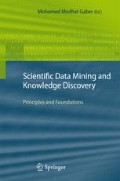Abstract
This book suits both graduate students and researchers with a focus on discovering knowledge from scientific data. The use of computational power for data analysis and knowledge discovery in scientific disciplines has found its roots with the revolution of high-performance computing systems. Computational science in physics, chemistry, and biology represents the first step towards automation of data analysis tasks. The rational behind the development of computational science in different areas was automating mathematical operations performed in those areas. There was no attention paid to the scientific discovery process. Automated Scientific Discovery (ASD) [1–3] represents the second natural step. ASD attempted to automate the process of theory discovery supported by studies in philosophy of science and cognitive sciences. Although early research articles have shown great successes, the area has not evolved due to many reasons. The most important reason was the lack of interaction between scientists and the automating systems. With the evolution in data storage, large databases have stimulated researchers from many areas especially machine learning and statistics to adopt and develop new techniques for data analysis. This has led to a new area of data mining and knowledge discovery. Applications of data mining in scientific applications have been studied in many areas. The focus of data mining in this area was to analyze data to help understanding the nature of scientific datasets. Automation of the whole scientific discovery process has not been the focus of data mining research. Statistical, computational, and machine learning tools have been used in the area of scientific data analysis. With the advances in Ontology and knowledge representation, ASD has great prospects in the future. In this book, we provide the reader with a complete view of the different tools used in analysis of data for scientific discovery. The book serves as a starting point for students and researchers interested in this area. We hope that the book represents an important step towards evolution of scientific data mining and automated scientific discovery.
Access this chapter
Tax calculation will be finalised at checkout
Purchases are for personal use only
Preview
Unable to display preview. Download preview PDF.
Author information
Authors and Affiliations
Corresponding author
Editor information
Editors and Affiliations
Rights and permissions
Copyright information
© 2009 Springer-Verlag Berlin Heidelberg
About this chapter
Cite this chapter
Gaber, M.M. (2009). Introduction. In: Gaber, M. (eds) Scientific Data Mining and Knowledge Discovery. Springer, Berlin, Heidelberg. https://doi.org/10.1007/978-3-642-02788-8_1
Download citation
DOI: https://doi.org/10.1007/978-3-642-02788-8_1
Published:
Publisher Name: Springer, Berlin, Heidelberg
Print ISBN: 978-3-642-02787-1
Online ISBN: 978-3-642-02788-8
eBook Packages: Computer ScienceComputer Science (R0)

